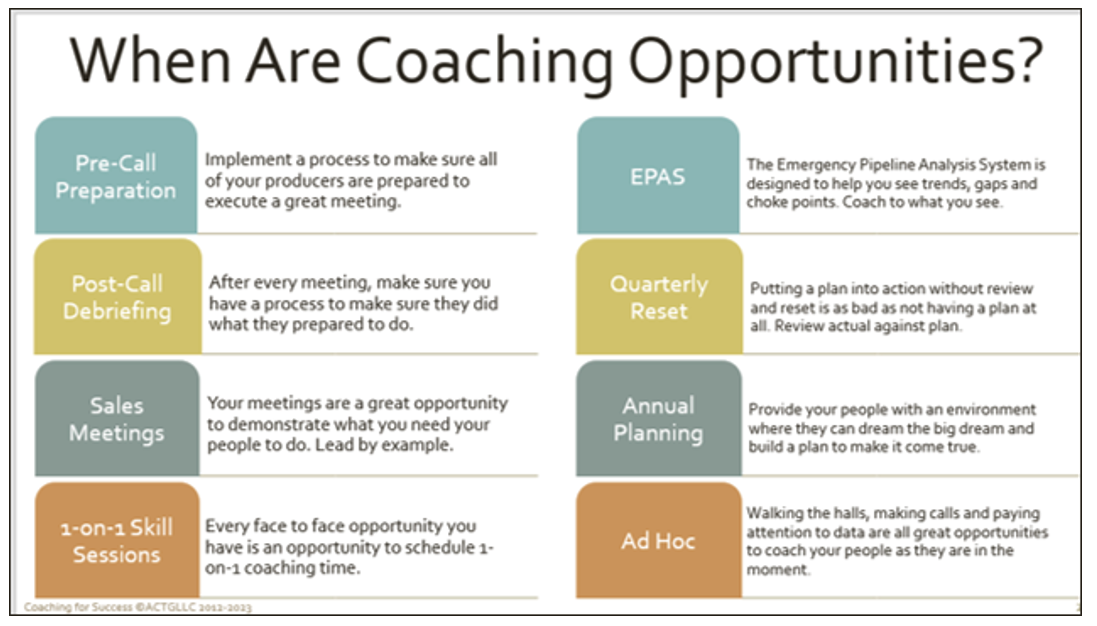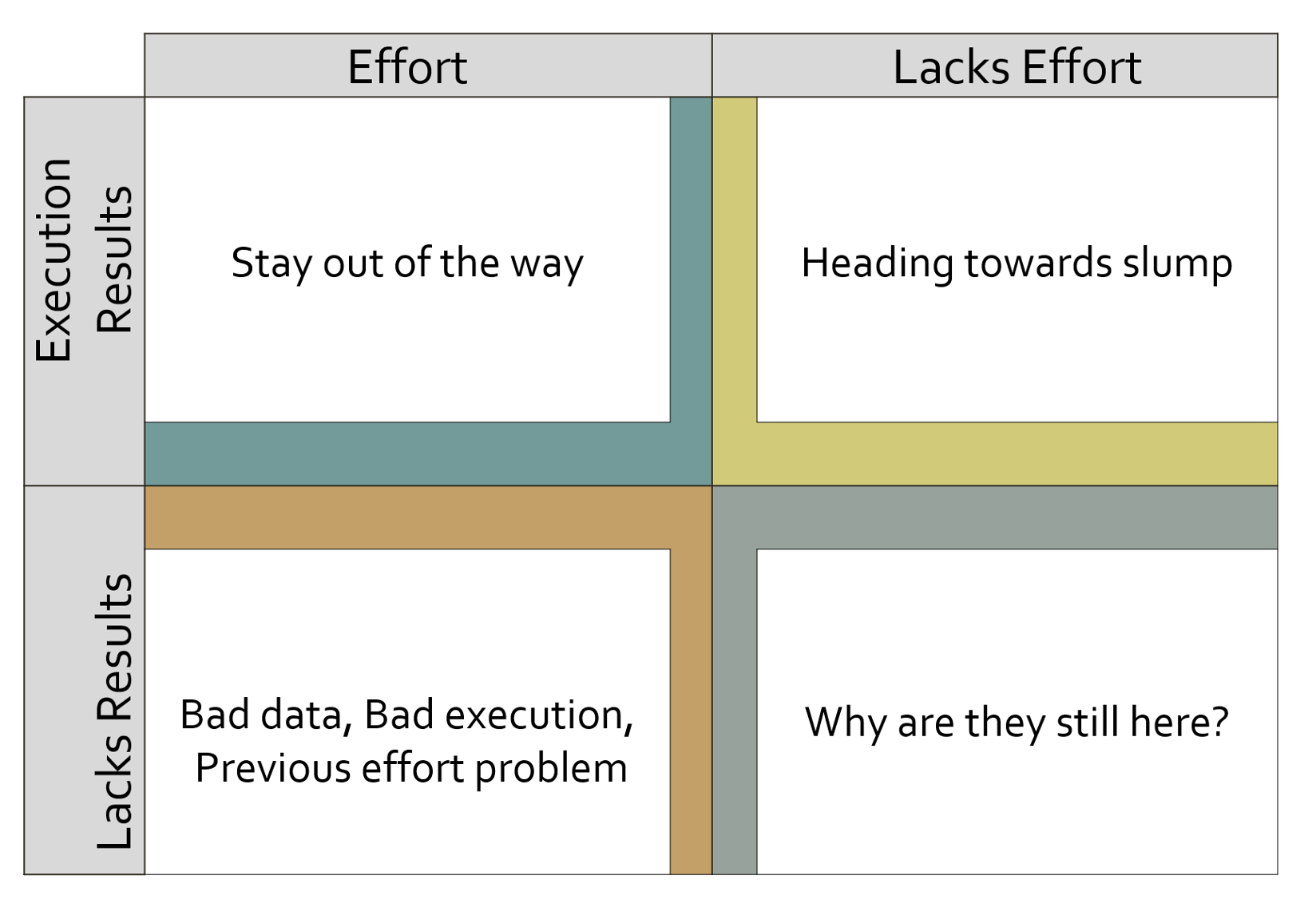We know that salespeople reporting to a manager with strong coaching skills tend to have 28% more close-able late-stage opportunities. This is from the deep data warehouse of Objective Management Group, our partner and the pioneer of the sales assessment. Unfortunately, we also know that less than 10% of sales managers are considered highly effective at this critical role of coaching. How do you know if you or one of your sales managers are skilled in this area?
- When this is a Weakness, an individual might believe that coaching means helping salespeople with pricing and technical questions on an ad hoc basis.
- When this is a Strength, an individual might schedule multiple coaching conversations with salespeople each week to improve their skills and help them win more sales.
If your company needs to grow, it is worthy of your time to focus on the importance of sales coaching, how to improve in this area and how effective coaching can drive sales growth for you and your organization. Skilled coaching helps drive sales growth by:
- Empowering Your Sales Team:
Coaching is about empowering your sales team by providing them with the tools, knowledge, and skills necessary to excel. It's not just about telling them what to do but leading them through a self-discovery process; a more effective way to teach them how to sell better. Effective coaching involves asking many questions of your salespeople about what happened on the sales call to uncover what happened, what was missed and what needs follow up. For example, instead of asking “who will make the final decision?” an effective coach will ask their salesperson “what did they say when you asked them about their decision-making process?” This approach initiates a broader discussion with more coaching opportunities and builds the salesperson’s confidence and competence, helping them to perform at improved levels.
- Improved Sales Skills:
In theory, Coaching helps sales professionals hone their skills, whether it's prospecting, handling objections or closing deals. But coaching sales tactics is not always effective because it does not address the underlying problem or reason for lack of performance. For example, if a salesperson is not making the prospecting effort that was agreed upon, it may be that they do not recover well from rejection, so just coaching them to make more calls is not going to be helpful. However, uncovering if rejection is a problem and coaching them on how to be more resilient will improve their skill levels, not just for today but in the future. Selling is fraught with rejection and unless your salesperson can bounce back and go on to the next prospect, a salesperson will forever struggle with prospecting. Given regular feedback and guidance, they can refine their techniques, resulting in more successful interactions with potential customers.
- Customized Approach:
There are 21 Sales Core Competencies that a salesperson must master to be an “elite” salesperson. That is a long list for any coach to effectively address, however, that is the goal. Some of these competencies are inherent in the person such as desire to excel, commitment to do what is necessary to achieve success and taking responsibility for their own actions and results, not blaming others or the organization. Other competencies however, must be coached such as how to get to the decision maker, how to overcome need for approval in order to ask the tougher questions and in today’s world, how to utilize the many social selling skills to connect, build credibility and find new relationships. One size does not fit all in sales. Coaching allows you to tailor your approach to individual salespeople's strengths and weaknesses. By understanding their unique needs, you can help them reach their full potential.
- Feedback and Accountability:
There is a 5-step process that every Coach should follow when coaching their salespeople.
- Gaining insight is all about what is happening in the field on a sales call or what is not The Coach can gain insight firsthand by observing a call or gather it from huddle data where you review sales behaviors and results. For example, how many calls and appointments are your salespeople supposed to make, and what were their results in a certain timeframe? Then, most importantly, what behaviors did your salespeople exhibit to get those results and if not to goal, how will they change their sales behaviors
- Giving Feedback is when coaching sales behaviors gets more difficult. Here are a few tips:
- Makes sure feedback is timely and specific
- Review the Good, Bad & Ugly (find something good to point out)
- Ask questions to help them self-discover
- Gain agreement on the real problem
- Demonstration of the sales behaviors you want and expect can be hard for many Coaches because they may not have come out of a sales role but they can demonstrate the questions needed to be asked and the sales approach that should be followed. We call this the Shadow of the Leader.
- Practice - Roleplay is never anyone’s favorite activity but once the sales manager has demonstrated the sales behavior, it is important to have the salesperson role play. Don’t call it role play, just name it a practice session but make sure they do it. Muscle memory needs repetition!
- Action Plan is putting the learning into action. Is the salesperson going to call the prospect back and ask those additional questions about their current provider? Make certain to identify specific actions that will take place, set a follow-up to discuss the outcomes, inspect, then coach their sales behaviors again. And don’t forget to celebrate the success and address the failures.
Effective coaching involves regular feedback and accountability. It helps salespeople understand where they can improve and holds them responsible for their performance. This accountability can drive better results and encourage a culture of excellence.
- Measurable Results:
The impact of coaching on sales growth is not just theoretical. It can be measured through key performance indicators such as larger account sizes, improved conversion rates, revenue per salesperson, and customer satisfaction scores. In order to ensure that coaching improves sales results, it is important to establish the metrics that will be measured and tracked in order to provide insights as to the coaching effectiveness.
We work with companies establishing Success Formulas that reflect the effort needed at each step of their sales process. For example, a company could track dials to contacts, contacts to appointments, appointments to sales opportunities, opportunities to presentations and presentations to closed sales. Many of these stages can be reflected in a company’s CRM. If these are tracked regularly, it is an ideal way for a Coach to identify at which step a salesperson is struggling. With strong coaching, many skills and the results of these steps can be improved, resulting in improved sales results.
Conclusion:
To fully harness the power of coaching, it's essential to foster a coaching culture within your organization. This involves making coaching a part of your company's DNA and encouraging all levels of management to engage in coaching activities. By implementing a coaching program within your organization, you can tap into the potential of your sales team and drive sustainable sales growth.






